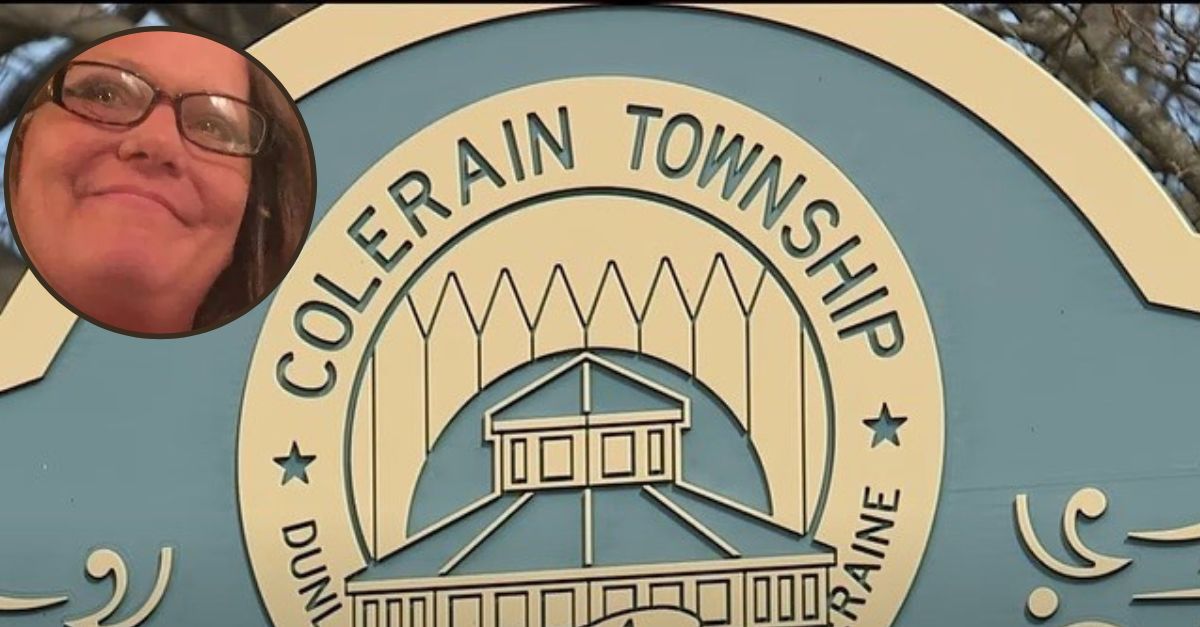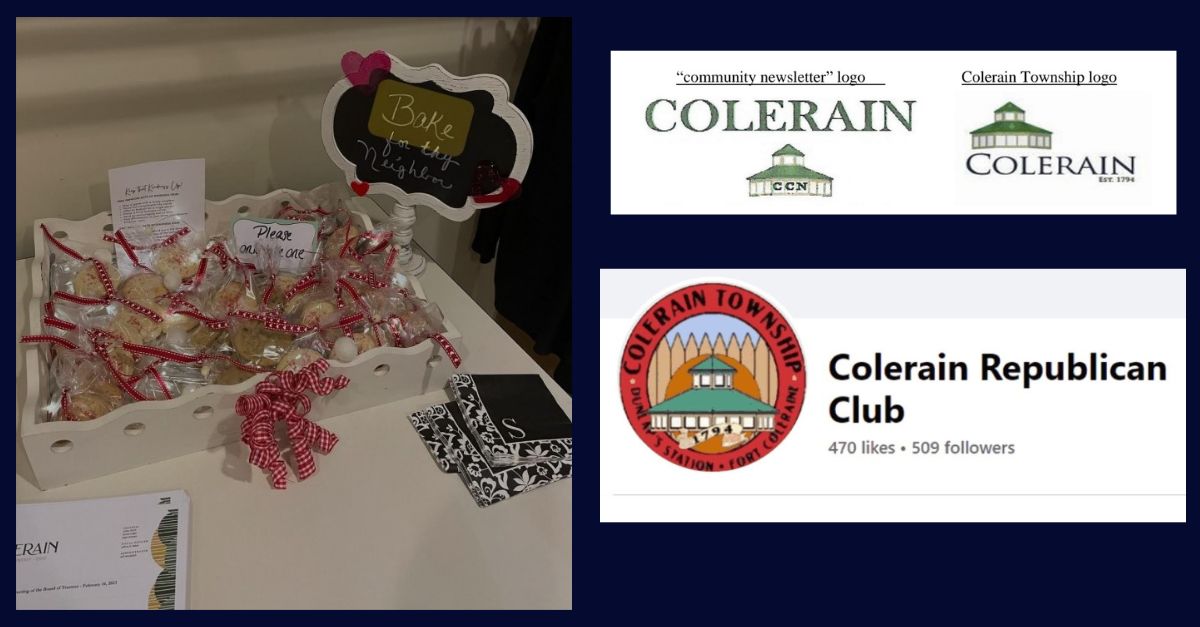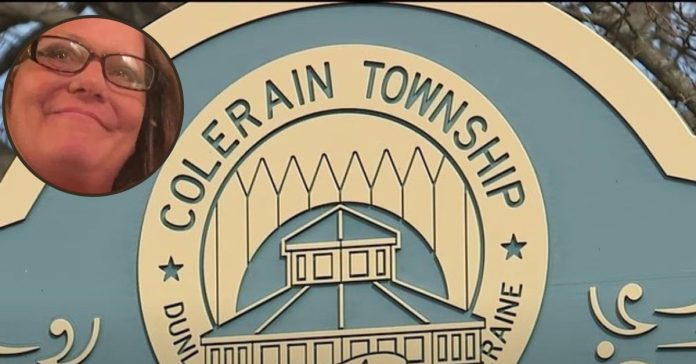
Background: YouTube screengrab of Colerain township sign in ABC affiliate report from WCPO. Inset: Carrie Davis photo approved for use by attorney.
There’s a case of bad blood brewing in Ohio according to a woman who has sued an entire township for what she says is retaliation for speaking out against the failures of local officials in her own newsletter.
Carrie Davis, a longtime resident of Colerain Township in Ohio — population just under 60,000 — has been an avid critic of her local community’s leadership, namely its board of trustees, for years.
The founder of a nonprofit children’s rights group and recognized for her achievements, Davis, a Democrat, ran for a House seat in Ohio in 2018. Though she lost, she hasn’t turned a scrutinizing eye away from what local officials are or, in her estimation, are not doing to serve the citizens of Colerain.
And that, she alleges, has now cost her her right to free speech.
Filed in Ohio federal court on Feb. 7, the 14-page civil lawsuit against Colerain Township, the board of trustees and Edwin Cordie III, the town’s police chief, alleges that when Davis left her newsletter next to a table full of cookies outside of a trustee’s meeting this January, her pamphlet was unconstitutionally confiscated to silence her.
The newsletter, which Davis designed and wrote under the title the “Council of Neighborhoods,” criticized the township for a number of things, most of them seemingly routine.
She criticized how public comment periods appeared to be shortened; she raised concerns about the potential levying of resident fees. She aired worries over the town’s projected bid and budget for a shopping mall as other long-standing priorities, like the beautification of areas that support existing small businesses, fell to the wayside, in her estimation.
She also claimed the town would soon be “facing another lawsuit alleging improper termination of a whistleblower.” According to Davis’ newsletter, the township leaders have been firing zoning administrators for the last six years to keep illicit conduct on the hush-hush.
At the top of her newsletter, she used a logo she created that invoked the town’s well known pavilion and superimposed her newsletter logo, CCN, over it in small font.

Left: In her civil lawsuit, Democrat Carrie Davis asks why she cannot leave a newsletter criticizing local public officials in the same way that participants may leave a tray of cookies as pictured outside of a January 2024 board meeting. Right top: Clipped from a cease-and-desist letter, Colerain town officials say the “community newsletter” logo used by Davis on left is too similar to their township logo on right. On bottom right: Davis’ lawyer says the town has not trademarked its name and that several other local entities use the “likeness” of a local pavilion just as she did, yet they are not punished for it.
Davis claims when she dropped off 30 copies of the newsletter for the Jan. 24 meeting, that was the last straw for the board. Cordie, she contends, saw stack of papers next to a pile of cookies and scooped them up once he realized what they said.
When Davis asked for them back, Cordie refused.
The police chief, she said, seized them and accused her of trademark infringement.
If that was really the case and he suspected Davis of committing a crime, her lawyer argues the police chief should have taken one and left the rest.
“Obviously, defendants wanted to stop Davis from distributing critical information about the defendants,” wrote attorney Matthew Miller-Novak.
Things didn’t end there.
After the run-in with Cordie, Davis said she then received a cease-and-desist letter from the town’s law director, Scott Sollmann, threatening legal action for the “unauthorized use of our township’s name, image and likeness in a recent newsletter.”
The logo on her masthead and the official town logo were too similar, the officials said.
“We understand the importance of community engagement, but wish to emphasize the necessity of obtaining consent before incorporating any elements associated with our township,” Sollmann wrote.
But Miller-Novak says that’s a thin attempt to censor Davis.
In exhibits filed alongside a request for a temporary restraining order against Colerain, Davis’ attorney underlined how local Facebook groups use logos evoking the famed local pavilion, too.
Take, for instance, the Colerain Republican Club, he noted. There are also close to 15 local businesses with “Colerain” in its name.
“The simple reality is that she is in fear of retaliation for criticizing her government leaders,” Miller-Novak told Law&Crime in an email Monday. “Imagine being a hardworking American, who is threatened with liability by a more powerful government entity if you ever even use the ‘name’ of your government in pamphlets.”
According to the lawsuit, “under defendant’s current ‘cease and desist letter,’ if Davis were to simply write, ‘I am Carrie Davis from Colerain, and I think Colerain’s leadership is terrible,’ Davis would be subject to both civil and criminal punishment for using Colerain’s ‘name.’”
He continued:
In addition, defendants threatened Davis against using Colerain’s likeness. Colerain is not Taylor Swift. Colerain cannot stop people from using pictures of Colerain.
Nonetheless, according to the defendants, they will punish Davis both civilly and criminally for using pictures of Colerain buildings and imagery to criticize Colerain’s leadership.
The restraining order, which would have allowed Davis to continue distributing her newsletter as the lawsuit played out, was denied in an order from U.S. District Judge Matthew McFarland, an appointee of Republican former President Donald Trump.
A review of the U.S. Patent and Trademark Office website appears to confirm Davis’ claim that the town itself has not registered a trademark for its name.
An attorney representing the township and police chief did not immediately respond to a request for comment Monday.
When the lawsuit was first filed last week, in a statement to reporters for ABC affiliate WCPO, a township spokesperson said they had received the lawsuit but denied ever violating Davis’ First and Fourth Amendment rights as alleged.
“At no point has the Township violated any of Ms. Davis’ rights. The Township will respond to the claims in more detail through its court filings,” the statement said.
Have a tip we should know? [email protected]

